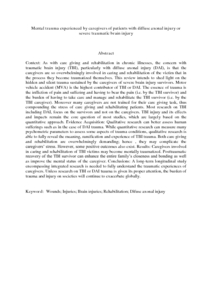Citation
Syed Hassan, Syed Tajuddin and Jamaludin, Husna and Abdul Raman, Rosna and Mohd Riji, Haliza and Khaw, Wan Fei
(2013)
Mental trauma experienced by caregivers of patients with diffuse axonal injury or severe traumatic brain injury.
Trauma Monthly, 18 (2).
pp. 56-61.
ISSN 2251-7464: ESSN: 2251-7472
Abstract
Context: As with care giving and rehabilitation in chronic illnesses, the concern with traumatic brain injury (TBI), particularly with diffuse axonal injury (DAI), is that the caregivers are so overwhelmingly involved in caring and rehabilitation of the victim that in the process they become traumatized themselves. This review intends to shed light on the hidden and silent trauma sustained by the caregivers of severe brain injury survivors. Motor vehicle accident (MVA) is the highest contributor of TBI or DAI. The essence of trauma is the infliction of pain and suffering and having to bear the pain (i.e. by the TBI survivor) and the burden of having to take care and manage and rehabilitate the TBI survivor (i.e. by the TBI caregiver). Moreover many caregivers are not trained for their care giving task, thus compounding the stress of care giving and rehabilitating patients. Most research on TBI including DAI, focus on the survivors and not on the caregivers. TBI injury and its effects and impacts remain the core question of most studies, which are largely based on the quantitative approach.
Evidence Acquisition: Qualitative research can better assess human sufferings such as in the case of DAI trauma. While quantitative research can measure many psychometric parameters to assess some aspects of trauma conditions, qualitative research is able to fully reveal the meaning, ramification and experience of TBI trauma. Both care giving and rehabilitation are overwhelmingly demanding; hence , they may complicate the caregivers’ stress. However, some positive outcomes also exist.
Results: Caregivers involved in caring and rehabilitation of TBI victims may become mentally traumatized. Posttraumatic recovery of the TBI survivor can enhance the entire family’s closeness and bonding as well as improve the mental status of the caregiver.
Conclusions: A long-term longitudinal study encompassing integrated research is needed to fully understand the traumatic experiences of caregivers. Unless research on TBI or DAI trauma is given its proper attention, the burden of trauma and injury on societies will continue to exacerbate globally.
Download File
![[img]](http://psasir.upm.edu.my/29625/1.hassmallThumbnailVersion/Mental%20trauma%20experienced%20by%20caregivers%20of%20patients%20with%20diffuse%20axonal%20injury%20or%20severe%20traumatic%20brain%20injury.pdf)  Preview |
|
PDF (Abstract)
Mental trauma experienced by caregivers of patients with diffuse axonal injury or severe traumatic brain injury.pdf
Download (149kB)
| Preview
|
|
Additional Metadata
Actions (login required)
 |
View Item |

